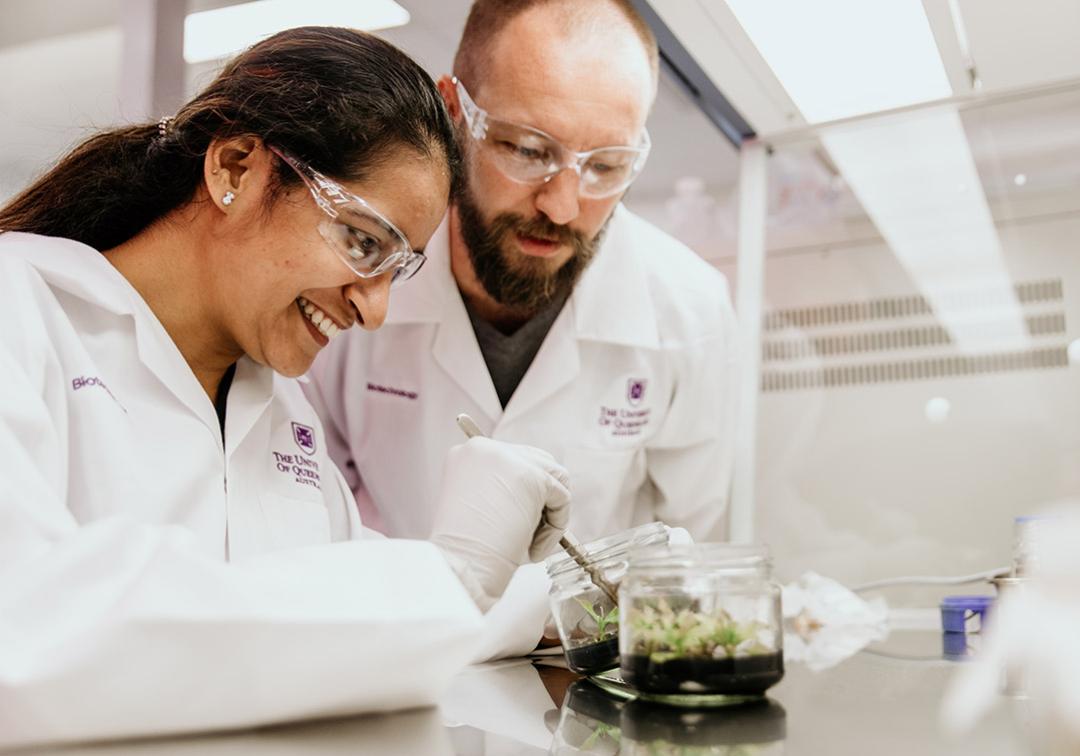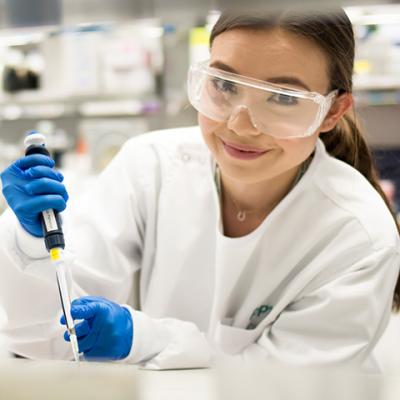
Bachelor of Biotechnology (Honours)
Overview
Pioneer new frontiers in health, agriculture, science, engineering and beyond.
Deepen your understanding of the key issues within biotechnology to join a fast-evolving industry improving global health and wellbeing.
At UQ, you’ll learn from award-winning scientists who have successfully commercialised their discoveries.
They'll guide you in your independent research project in one of the following fields of biotechnology:
- Agricultural
- Chemical and Nano
- Medical
- Molecular and Microbial
- Synthetic Biology and Industrial.
This program will prepare you for a wide variety of employment opportunities in Australia’s thriving life sciences sector, including the biotechnology, pharmaceutical, food, medical and agricultural technology industries.
Alternatively, further your research ambitions and make significant contributions to knowledge by enrolling in a higher degree by research program.
Program highlights
- Tailor your studies to your interests and career goals with a flexible program that gives you the freedom to follow your scientific and entrepreneurial passion.
- Access world-class laboratory, research and computer facilities to gain hands-on experience.
- Learn from Australia's leading educators in biotechnology and equip yourself with advanced skills.
- Take advantage of UQ’s strong links to industry, government and the research community to build your professional network.
Majors
Tailor your studies to suit your goals. This program offers these options:
- Agricultural Biotechnology
- Chemical and Nano Biotechnology
- Medical Biotechnology
- Molecular and Microbial Biotechnology
How you'll learn
Your learning experiences are designed to best suit the learning outcomes of the courses you choose.
- Work placements
- Research experience
- Laboratory work
- Workshops
What you'll study
At UQ, degrees are called 'programs' and subjects are called 'courses'. Here's a sample of the courses you could study in this program:
- Honours Research Project
Career possibilities
Our programs prepare you for your first job and beyond. Depending on which major you choose, here are some of the careers you could be on your way to:
- Research officer
- Bioprocess scientist
- Quality control manager
- Biochemist
- Research scientist
- Microbiologist
- Cancer researcher
- Trial coordinator
- Lecturer
Average annual salary range
Microbiologist
seek.com.au
Average annual salary range
Research Associate
seek.com.au
Next steps after graduation
Your high-level knowledge and technical skills will be relevant to a range of modern biotechnologies.
Careers in biotechnology span many industrial and service sectors, including health, agriculture, diagnostics, environment, forestry, law and commerce.
With more than 2,600 companies operating in the growing Australian biotechnology industry, you’ll be well placed for roles in:
- agricultural industries (in areas such as plant breeding and engineering)
- chemical companies (in areas such as nanotechnology and biosensor applications, and developing drug leads)
- diagnostic companies (undertaking diagnostic test design, development and production)
- government agencies (as a technology analyst or commercialisation officer)
- legal and consulting companies (as a business plan analyst)
- pharmaceutical companies (in areas such as drug design and development or pharmaceutical production, as well as research institutes, universities or industry)
- venture capital companies
- startup ventures.
Alternatively, you can use this qualification to further your research ambitions and make significant contributions to knowledge by enrolling in a higher degree by research program.
Events
See all events
29 June
Queensland Biology Winter School, Year 12
Stories
See all stories
Careers
Study biotechnology at UQ to cultivate a cutting-edge career
5-minute read

UQ people
Science skills + business savvy = biotech success
4-minute read
Stories
See all stories
Careers
Study biotechnology at UQ to cultivate a cutting-edge career
5-minute read

Study tips
How to fast-track entrepreneurial success with the lean startup method
7-minute read
Entry requirements
Prerequisites
- a grade point average (GPA) of 4.0 on a 7-point scale, and
- a GPA of at least 4.5 for 8 units of courses at level 3 or higher relevant to the honours project, and
- have secured an honours project and supervisor, and
- satisfied any additional requirements set by the head of school.
Prerequisites
- a grade point average (GPA) of 4.0 on a 7-point scale, and
- a GPA of at least 4.5 for 8 units of courses at level 3 or higher relevant to the honours project, and
- have secured an honours project and supervisor, and
- satisfied any additional requirements set by the head of school.
English language requirements
IELTS overall 6.5; reading 6; writing 6; speaking 6; listening 6. For other English Language Proficiency Tests and Scores approved for UQ
TOEFL iBT (including Paper Edition) - Overall 87, listening 19, reading 19, writing 21 and speaking 19.
PTE Academic - Overall Score of 64 and 60 in all sub bands.
BE - A minimum overall grade of 4 plus a minimum grade of C in all macro skills.
CES - Overall 176 and 169 in all sub bands.
OET is not accepted.
There are other ways to meet the English language requirements. For some programs, additional conditions apply.
Student visas
International students who are accepted into full-time study in the Bachelor of Biotechnology (Honours) are eligible to apply for an Australian student visa (subclass 500).
There are a number of requirements you must satisfy before a visa is granted, including the Genuine Student (GS) requirement.
Fields of study
Fields of study
Tailor your studies to suit your goals. This program offers these options:
Fields of study
Tailor your studies to suit your goals. This program offers these options:
Fees and Scholarships
Indicative annual fee
Approximate yearly cost of tuition (16 units). Your fees will vary according to your selected courses and study load. Fees are reviewed each year and may increase.
$10,275
2025
Approximate yearly cost of tuition (16 units). Your fees will vary according to your study load. Fees are reviewed each year and may increase.
AUD $53,760
2025
Government assistance
Financial aid
As an international student, you might be eligible for financial aid – either from your home country, or from the Australian Government.
HECS-HELP
Domestic places in the Bachelor of Biotechnology (Honours) are Commonwealth supported, as long as you meet all Commonwealth supported place eligibility requirements.
This means the cost of your education is shared between you and the Australian Government. Instead of tuition fees, Commonwealth supported students pay what are called student contribution amounts.
If you have a Commonwealth supported place, you may also be eligible for HECS-HELP. This is an Australian Government loan scheme to assist eligible students with the cost of their student contribution amounts.
Centrelink support
The Australian Government offers a number of income-support payments to eligible Australian university students.
Scholarships
You may be eligible for more than 100 scholarships, including:
How to apply
Applying online
All international applications should be submitted to UQ. If you prefer, you can use an approved UQ agent near you.
The program code for the Bachelor of Biotechnology (Honours) is 2457.
Applying online
All domestic applications should be submitted to UQ.
The program code for the Bachelor of Biotechnology (Honours) is 2457.
Important dates
The closing date for this program is:
- To commence study in semester 2 2025 - 5 May 2025 (with offer acceptance due 18 May 2025).
- To commence study in semester 1 - November 30 of the previous year.
Visa processing times vary. Apply and accept your offer as early as you can.
To learn more about UQ dates, including semester start dates, view the Academic Calendar.
Important dates
The closing date for this program is:
- To commence study in Semester 1 - January 31 of the year of commencement.
- To commence study in Semester 2 - June 30 of the year of commencement.
To learn more about UQ dates, including semester start dates, view the Academic Calendar.
Aboriginal and Torres Strait Islander applicants
For support with applying – or if you have any questions about university life – get in touch with our Aboriginal and Torres Strait Islander Studies (ATSIS) Unit.
Explore other programs
Express yourself. And your interest.
They say choosing a degree is hard, which is why we've made it easy. Register your interest and we'll send you everything you need to know about applying to UQ.







